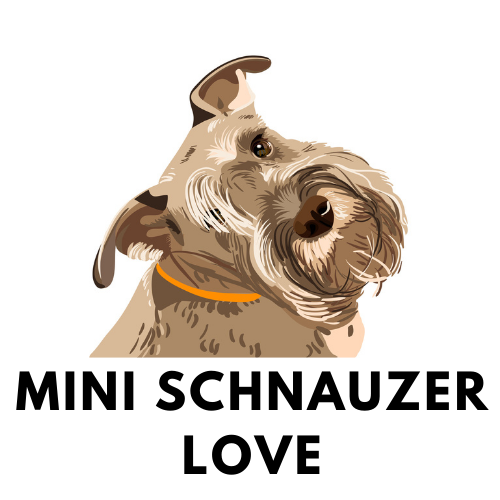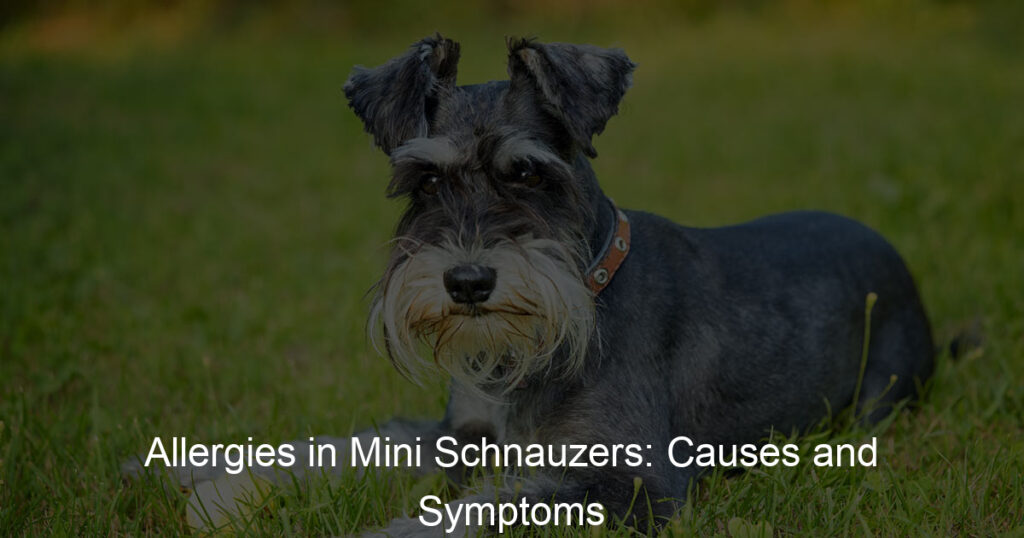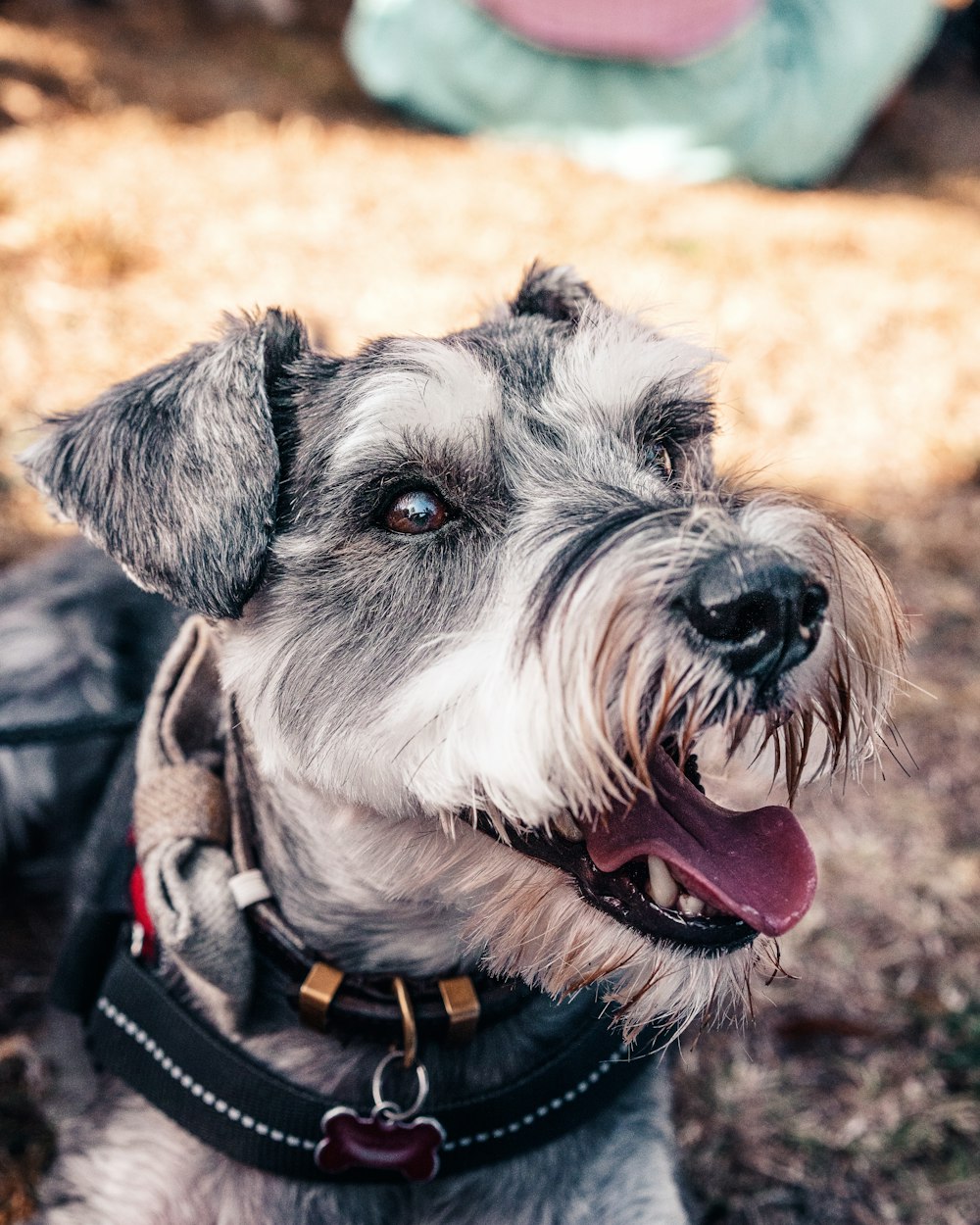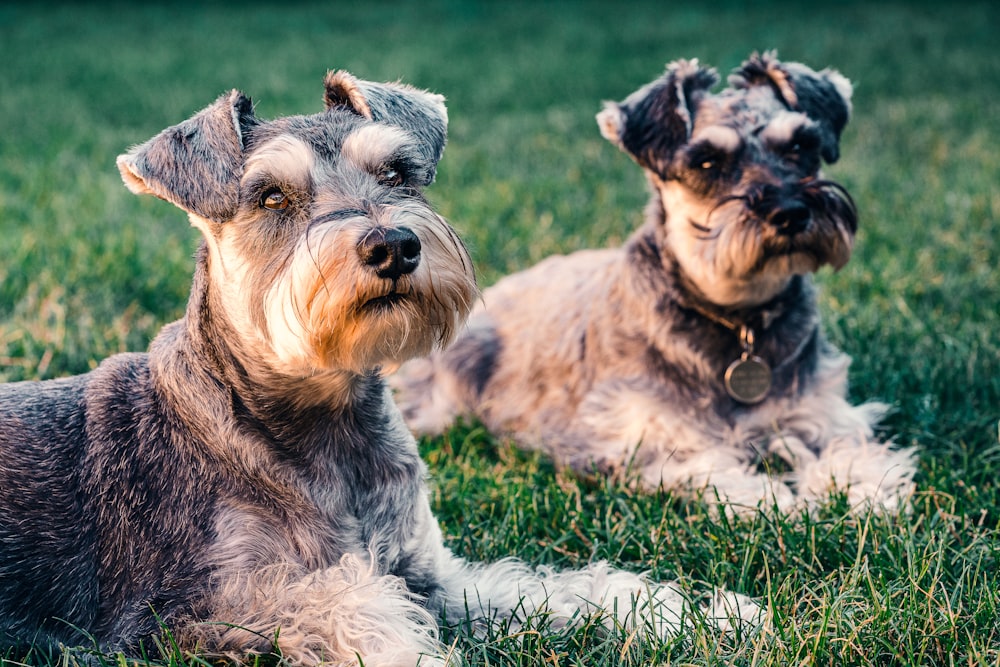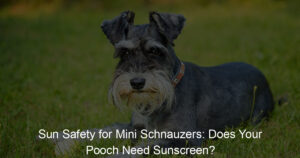If you’re the owner of a Mini Schnauzer, you may be all too familiar with the potential for allergies. In this breed, allergies are unfortunately pretty common.
But what exactly are they allergic to? And what are the symptoms? Keep reading to find out more about allergies in Mini Schnauzers.
Allergies are a common problem in mini schnauzers, just like any other dog breed. The most common allergies include environmental allergies (such as pollen), food allergies, and contact allergies. Symptoms of allergies can include itching, redness, hair loss, and excessive licking.
If you think your mini schnauzer has an allergy, take them to the vet for diagnosis and treatment options. There are many ways to manage allergies in mini schnauzers, so don’t despair if your dog is affected – there is help available!
What are common allergies for Miniature Schnauzers?
Miniature Schnauzers are an adorable breed of dog – but even these cute canines can suffer from allergies. Common allergies found in Miniature Schnauzers include environmental factors like pollen, molds, house dust mites, and grasses.
They can also be affected by food-related allergies due to proteins found in their diets such as beef, lamb, chicken, fish, corn, wheat, and soy; or on rare occasions, even the preservatives typically used in dog food.
Other symptoms that may appear to be allergies may not actually be related to the environment or food at all.
In some cases, skin rashes may be caused by a reaction to parasites like fleas or inner ear infections that require veterinary treatment. Allergy symptoms mostly include itchy skin with lesions or scabbing as well as breathing difficulties.
Knowing what your Schnauzer is allergic to will help ensure they receive the appropriate medication and care needed to keep them safe and healthy.
What skin problems are common in Mini Schnauzers?
Mini Schnauzers are beloved for their sweet dispositions as well as their bright personalities, but they are also prone to problematic skin conditions.
These include allergic dermatitis, seborrhea, and bacterial infection. Allergic dermatitis is a common reaction to environmental irritants or food allergies that often results in itchiness and other uncomfortable symptoms like skin lesions or hair loss.
Seborrhea is known for causing red and flaky scaling of the skin.
Finally, bacterial infections can result from issues with the skin’s natural microbiome and cause a variety of symptoms including changes in color, itching, and scraping, as well as poor coat health.
Thankfully, regular visits to the vet can keep these issues under control by prescribing an appropriate treatment plan along with lifestyle changes and diet adjustments when necessary.
What foods are Schnauzers allergic to?
Schnauzers are typically active and inquisitive dogs, but their energy can take a hit if they suffer from food allergies.
Foods Schnauzers can be allergic to include beef, dairy, chicken, pork, wheat, and soy. Common signs of allergies in these dogs are excessive scratching and chewing of the paws or skin, facial swelling, ear infections, and vomiting.
An unfortunate result of these allergies is that Schnauzers can sometimes develop an aversion to many foods as they grow older, making dietary changes more challenging over time.
If you suspect your Schnauzer is suffering from food allergies it’s important to speak with your veterinarian for the best advice on how to navigate potential new diets and nourish your pup correctly.
What are the signs and symptoms of allergies in dogs?
Allergies can be a tricky beast for both humans and dogs. They often crop up suddenly and the signs and symptoms can vary from dog to dog.
Generally speaking, allergies in a pup may manifest as itchiness, redness of the skin, hives, sneezing or coughing, runny eyes or nose, vomiting, and/or diarrhea.
To diagnose it properly though you will usually need to take your dog to the vet so they can give your pup an appropriate medical exam and treatment plan. Knowing these signs will help you better protect your canine companion from the discomfort of allergies.
| Category | Causes | Symptoms |
|---|---|---|
| Food allergies | Certain proteins or grains in their diet, food additives, or preservatives | Skin rash, itching, diarrhea, vomiting |
| Environmental allergies | Pollen, mold, dust mites, or other environmental factors | Sneezing, runny nose, itchy eyes, skin rash |
| Contact allergies | Certain materials such as plastics, fabrics, or cleaning products | Skin rash, itching, hair loss, swelling |
| Insect allergies | Bee stings, flea bites | Swelling, difficulty breathing, vomiting |
Please note that this table is for illustrative purposes only, and any opinions expressed in it are solely those of the requester. If you suspect your Miniature Schnauzer is suffering from allergies, please consult with a veterinarian for proper diagnosis and treatment.
Allergies in Mini Schnauzers: Causes and Symptoms
Are you or someone you know looking into adopting a mini schnauzer? If so, it’s important to be aware of the fact that your pet may develop allergies.
Just like humans, dogs can suffer from several types of allergies and, unfortunately, this breed isn’t exempt from having allergy issues of their own. This blog post will provide an in-depth look at the different types of allergies mini schnauzers are prone to developing as well as how to recognize the symptoms associated with them.
So if you’re considering becoming or already are a proud owner of a mini schnauzer, keep reading for all the information about this issue—from causes and symptoms right through to treatment options!
Overview of Mini Schnauzer allergies – what are the common triggers and symptoms
Miniature Schnauzers are beloved for their unique appearance, cheerful nature, and playful disposition. However, just like humans, these furry friends are susceptible to allergies.
Allergies in Mini Schnauzers can manifest in various ways, including itchy skin, ear infections, and digestive issues. Common triggers for allergies in Mini Schnauzers include foods, fleas, pollen, and dust mites. Some of the symptoms of Mini Schnauzer allergies include excessive licking, scratching, and chewing on their paws.
If you notice any of these symptoms, it is important to take your furry friend to the vet for prompt and proper treatment. With the right care and attention, you can help your Mini Schnauzer live a happy and healthy life, free of allergies.
Food-based allergies – identifying which foods trigger an allergic reaction and how to minimize them
Allergies can affect not only humans but also our furry friends, such as Miniature Schnauzers. These allergies can cause unwanted symptoms, including itchy skin, ear infections, and digestive issues, resulting in discomfort and stress to our beloved pets.
Identifying which foods trigger an allergic reaction is crucial in managing it. It is essential to consult a veterinarian to determine the specific allergens and create a plan to minimize exposure.
A specialized diet or elimination trial may also be recommended to see if there will be an improvement in the Mini Schnauzer’s condition. As pet owners, we have a responsibility to provide the best possible care, and knowing how to handle food-based allergies is one way of achieving that.
Environmental allergies – what environmental factors can cause a Mini Schnauzer to suffer from allergies
If you are a proud owner of a Mini Schnauzer, it is important to keep an eye out for signs of allergies. Environmental factors can play a big role in triggering allergies in these adorable pups.
Some common causes of Mini Schnauzer allergies include pollen, dust mites, mold, and even certain types of food. Once the allergies are triggered, they can result in symptoms such as itchy skin, red or watery eyes, sneezing, and even ear infections.
If you notice any of these symptoms in your furry friend, don’t hesitate to speak with your veterinarian. They can help you identify the underlying cause of the allergies and recommend the best treatment plan to keep your Mini Schnauzer healthy and happy.
Seasonal allergies – understanding the different seasonal allergens that affect Mini Schnauzers and how to keep them safe during allergy season
As Mini Schnauzer owners, we want to keep our furry friends feeling happy and healthy all year long. Unfortunately, seasonal allergies can make that a challenge.
Understanding the specific allergens that affect Mini Schnauzers and the symptoms they can cause is key to keeping them safe and comfortable during allergy season. Common allergens for Mini Schnauzers include pollen, dust mites, and mold spores.
Symptoms of allergies in Mini Schnauzers can range from coughing and sneezing to skin irritation and intense itching. To keep our pups safe, we can limit their exposure to allergens by keeping them indoors during peak pollen times, regularly bathing them to remove allergens from their coats, and working with a veterinarian to develop a treatment plan that meets their specific needs.
By staying proactive and informed, we can help our Mini Schnauzers thrive during allergy season.
Skin allergies – learn about skin conditions that can be caused by an allergic reaction in Mini Schnauzers, including itchiness and lesions
If you’re a Mini Schnauzer owner, it’s important to be aware of the various skin conditions that can be caused by an allergic reaction. Skin allergies can be particularly frustrating for your furry friend, as they can lead to itchiness, lesions, and irritation.
Causes of skin allergies in Mini Schnauzers can vary from pollen to food, so it’s essential to monitor any changes in your pup’s behavior and well-being. Knowing the potential causes and symptoms of allergies can help you keep your pup comfortable and healthy, and ensure that they continue to thrive.
Treatments for allergies in Mini Schnauzers – holistic and conventional methods to reduce the severity of symptoms
Allergies in Mini Schnauzers can be a challenging issue to address. With various causes and symptoms, it is essential to find the most effective treatment options.
Pet owners may consider both holistic and conventional methods to reduce their furry friend’s allergy severity. It is important to identify the root cause of the allergies before deciding on a treatment plan.
Holistic options such as acupuncture, herbal supplements, and dietary modifications can be effective in reducing symptoms. On the other hand, conventional approaches like allergy shots, antihistamines, and corticosteroids can also provide relief.
A combination of both may be recommended by veterinarians to achieve the best results. By exploring various treatment options, pet owners can help their beloved Mini Schnauzers live a happy and healthy life.
Allergies in Mini Schnauzers: Causes and Symptoms
Allergies in dogs can manifest in various ways, including sneezing, coughing, runny eyes or nose, skin irritation, and itching. It’s also possible that you may experience an allergic reaction without any visible symptoms from your pup.
Knowing what signs to look for and understanding the potential triggers for these allergies can help you determine whether or not your beloved pet is the source of your discomfort. In this blog post, we will discuss how to recognize when your dog is causing allergies as well as their potential causes and treatments.
So keep reading if you’re concerned that Fido could be making life difficult!
Bringing it All Together: Allergies in Mini Schnauzers: Causes and Symptoms
All in all, taking care of a Miniature Schnauzer as a well-rounded pet requires knowledge of their various allergies and health issues.
Knowing what their common allergies are, what skin problems may occur, what foods to avoid and the signs and symptoms that point to an allergy is essential. Therefore, understanding the scope of allergies could help keep your Mini Schnauzer out of harm’s way.
Regular vet checkups should become part of your routine to ensure you’re doing the best for your pup’s health – but don’t forget about keeping them safe from coming into contact with any potential allergens like pollen or dust across your home environment as well.
Maintaining proper hygiene for both you and your dog can be key in preventing allergies and having a good relationship with a vet is always beneficial in catching possible health issues at an early stage.
Thanks for joining us on this journey – we hope to have helped shed some light on common allergies for Miniature Schnauzers and how to spot any problematic skin conditions that may occur.
